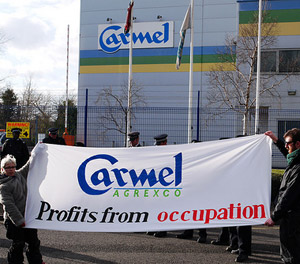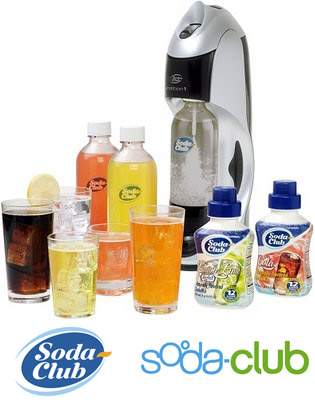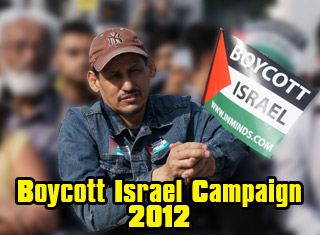
 Innovative Minds © 2014. All Rights Reserved. www.inminds.co.uk | |||||||||||||||
Flouting its own laws, EU accommodates 'Made in Israel'David Cronin, The Electronic Intifada Historians looking back on November 2008 might record it as a time when normally astute commentators succumbed to a fantasy. In the same week that Barack Obama became America's first black president, some governments on the other side of the Atlantic tried to chime with the message of hope his public relations machine had honed to near-perfection. The highest echelons of Britain's ruling Labor party even tried to rekindle a modicum of the magic that many sensed when it came to power 11 long years earlier. Although Tony Blair and Gordon Brown had until then been cheerleaders for Israeli aggression, their ministers suddenly transformed themselves into champions of Palestinian rights.  Protest outside Carmel Agrexco depot(UK)
Agrexco, one of the leading Israeli exporters of agricultural goods, is known to mix goods from within Israel with those from the settlements in its depots and label the whole lot as Israeli
This sleight of hand was performed with the aid of a terse document dispatched from London to Brussels. In it, Britain expressed concern about how goods originating from Israeli settlements in the West Bank may be benefiting illegally from European Union trade preferences that theoretically only apply to businesses within Israel's internationally-recognized borders. The one-page note stated that the British customs authorities were conducting spot checks on imports claiming to be "Made in Israel" and would forward the findings to the European Commission, the executive arm of the European Union (EU). Leaked ahead of a meeting of EU foreign ministers, the note garnered the kind of fawning media coverage that the spin doctors who became synonymous with Blair and Brown often worked hard to manufacture. "Britain is taking the lead in pressing the EU to curb imports from Israeli producers in the occupied West Bank as a practical step towards halting the steady increase in the construction of Jewish settlements," Donald Macintyre, Jerusalem correspondent with the London-based Independent, reported. More than a year later, observers have been asking: where is this combination of leadership and practicality now? Despite the clear promise to present evidence to the Commission, officials working with that institution say that nothing has been formally transmitted to them from Britain or any other EU government since then that would enable them to take action against Israel over its abuse of trade preferences. This is partly explained by the inability of inspectors to detect abuses. A spokesman for the British customs authorities told me that during 2009, just one "labeling irregularity" had been identified when fruit and vegetables purporting to be from Israel were examined. In that case, the documents accompanying a consignment of food said that it had originated in Israel but a perusal of its packaging revealed it was actually from the Jordan Valley, according to the spokesman.
As much as 80 percent of all exports to Britain from the settlements are shipped under false pretenses..
The low number of "irregularities" found does not mean that Israeli exporters are generally playing by the rules set out in the association agreement between the EU and Israel, which came into force in 2000. Under it, goods from within Israel's pre-1967 boundaries can generally enter the EU without being subject to customs duties but this privilege does not extend to goods from Israeli settlements in the Occupied Palestinian Territories (OPT). Phyllis Starkey, a conscientious Labor Party Member of Parliament, noted recently that the total amount that Britain raised on customs duties levied on goods from Israeli settlements in 2009 amounted to less than #22,000. By contrast, the annual sum gathered on goods from the settlements in the 2005-08 period was #110,0000. Starkey estimates that as much as 80 percent of all exports to Britain from the settlements are shipped under false pretenses. Britain is Israel's third-largest trading partner. EU officials should not be allowed to shirk their responsibilities to investigate these matters further. In 2005, following complaints that goods from the settlements were routinely labeled as "Made in Israel," the EU introduced guidelines ("technical arrangements," in diplomatic parlance) designed to help customs officials distinguish between a bona fide Israeli good and one from the OPT or the occupied Golan Heights. But these rules -- which essentially involve checking postcodes -- have proven notoriously easy to circumvent. The Israeli business magazine Globes has advised how to do so: "You invent an address within the Green Line [the internationally-recognized boundary between Israel and the occupied West Bank] and operate using this address. In this way you do not have to pay the customs fees that apply to products exported from across the Green Line. The method works, but not for those whose company carries a name that gives away the true location -- such as Golan Height Wineries."  Cosmetics-maker Ahava uses Dead Sea products from the occupied Jordan Valley in its products Some Israeli firms brag openly about how they can sell goods from the settlements abroad without paying duties. Cosmetics-maker Ahava uses Dead Sea mud extracted from the occupied Jordan Valley in its products. When quizzed about this by the BBC, the company's representatives admitted that they give the address of their headquarters and not the site of production when exporting. Thus, they can avail -- fraudulently -- EU preferences. The relaxed attitude of civil servants to how European and international law is being flouted by Israel -- Britain's 2008 initiative notwithstanding -- is in stark contrast to the courage displayed by numerous ordinary people. Supermarkets in several EU countries have been flooded with complaints from customers outraged at how they are stocking herbs or oranges from illegal settlements. In response to this burgeoning grassroots awareness, Britain's Department for the Environment, Food and Rural Affairs has published recommendations to retailers on how to differentiate between food originating from Israeli settlements, that from within Israel, and that grown by Palestinian farmers (several anti-poverty organizations sell Palestinian olive oil and other produce using a "Fair Trade" label). The interpretation of these recommendations has meant that shoppers can encounter confusing and clumsily-phrased notices while searching for groceries. The Morrisons supermarket chain has displayed the following instructions beside its stocks of "Best Medjool" dates: "Please note product labeled 'Produce of Jordon [sic] Valley' is produced in the West Bank (Israeli settlement) and produce of Israel is not from the occupied territories." Betty Hunter from the Palestine Solidarity Campaign described the guidance to retailers as "absolutely inadequate" as she believes that no goods from Israeli settlements should be sold in Europe, regardless of whether they have been subject to customs duties. Activists from her group plan to attend the annual shareholder meetings of Britain's main supermarkets later this year and to advocate a complete ban on such goods. (The campaign is also committed to a wider boycott of Israeli goods.) John Hilary, director of the organization War on Want, concurs. "It is quite clear that the settlements are illegal under international law," he said. "For us, there is no justification for goods from the settlements to be allowed in any European country at all."  Soda Club a company based in the Mishor Adumim industrial zone located near Maale Adumim, one of the largest Israeli settlements in the occupied West Bank Yet EU officials have not only failed to defend international law, they have accommodated Israel's abuse of it. Last month, the European Court of Justice ruled that goods from illegal settlements are not eligible for preferential treatment from the EU. The verdict related to the activities of Brita, a German manufacturer of water filters, which buys accessories and syrups from Soda-Club, a company based in the Mishor Adumim industrial zone located near Maale Adumim, one of the largest Israeli settlements in the occupied West Bank. Charles Shamas from the Mattin Group, a Ramallah-based organization that monitors the EU's relations with Israel, followed the court proceedings vigilantly. During the final stages of the proceedings in the autumn of last year, he revealed how the Commission's lawyers told the court that the whole issue could be resolved if the Palestinian Authority issued certificates for the goods, rather than Israel. "This was a fallacious argument," Shamas said. "The Commission did not want to tell the court that these operators [in Israeli settlements] should be frozen out of any preferential treatment with the European Union." Maysa Zorob, Brussels representative with the Palestinian human rights group Al-Haq, said that exports from Israeli settlements are a "very inconvenient issue" for Europe. "I doubt that the EU's member states will be excited about implementing the ruling of the European Court of Justice," she added. "The EU has a big economic interest in supporting these products and granting them tax-free status would mean there would be a lot more trade. A lot of big companies manufacture in the settlements and give the postcodes of Israel proper when exporting. The problem is that Israel has quite a big margin for fraud." Another signal of how the EU is eager to develop closer ties with Israeli firms, including those known to operate in the settlements, came in late 2009, when both sides agreed to liberalize agricultural trade between them even more fully. As a result, 80 percent of Israel's fresh produce and 95 percent of its processed foods can be exported to the EU free of customs duties. Theoretically, food and drink companies in Israeli settlements will not benefit from this latest deal. But in practice they will. Agrexco, one of the leading Israeli exporters of agricultural goods, is known to mix goods from within Israel with those from the settlements in its depots and label the whole lot as Israeli. This firm alone is estimated to control more than 60 percent of all exports of settlement produce. The EU's weak response on this issue can be traced to those heady days of November 2008. Within a fortnight of the UK's declaration on mislabeling of Israeli exports, Peter Mandelson, Secretary of State for Business, Innovation and Skills, was sharing a platform with Israeli President Shimon Peres and voicing hopes that the value of British trade with "our firm friend" Israel would jump from its 2007 level of #2.3 billion to more than #3 billion by 2012. "Doublethink means the power of holding two contradictory beliefs in one's mind simultaneously and accepting both of them," George Orwell wrote in Nineteen Eighty-Four. That is the kind of duplicity Britain tries to get away with by embracing the very same Israeli firms whose theft of Palestinian land it professes to disdain. David Cronin's book Europe's Alliance with Israel: Aiding the Occupation will be published later this year by Pluto Press. Source: http://electronicintifada.net/v2/article11130.shtml Related ArticlesAlso Of InterestPage URL: http://inminds.co.uk/article.php?id=10306
|
|
Support Us
If you agree with our work then please support us.Campaigns INMINDS Facebook Live Feed Latest Video's
INMINDS Twitter Feed Tweets by @InmindsComFeatured Video's
You need Flash player 8+ and JavaScript enabled to view this video.
[all videos (over 200)..] Featured MP3 Podcast  "1763 in the Ohio river valley you got Lord Jeffrey Amherst committing to written order an instruction to his subordinate Henry Bouquet, having been defeated by Pontiac Ottawa confederacy in the field. The order essentially says that they have been defeated militarily and is therefore necessary for Amherst forces to request a peace, to sue for peace from Pontiacs people. He instructs Bouquet to convene a parlay with the Indian leadership for that purpose. And as is the custom, as is common courtesy among native populations as was known to the Brits at that time, it would be necessary for those who requested the council to give gifts to those requested to attend. Make those gifts, Amherst says, items taken from a smallpox infirmary in order, I'm going to quote directly now, this isn't a paraphrase: 'in order that we may extirpate this execrable race'. Now key is on this last word, had he said that we might eradicate the opposing combatants, their military capacity, their warriors.. what ever term he wanted to use, it would have been biological warefare. But he didn't say anything about that, he said the 'race'. His intent was to use biological means, to use disease, quite explicitly so, to eradicate an entire population group. And Bouquet was also kind enough to commit to writing in his response the next day, I have done as instructed, dispersing three blankets, two handkerchiefs and sundry other items, hopefully, he says, they will have the desired result. They did.. the lowest estimate of the number of people who died of smallpox as a result of that little gesture of friendship and goodwill is a 100,000!" American Indian scholar, activist in the struggle for liberation of Indigenous Peoples in America On the publication of the book 'A Little Matter of Genocide: Holocaust and Denial in the Americas, 1492 to the Present', 1997 [29min / 10Mb] [all podcasts..] Newsletter Feedback |
 |
 |



























































